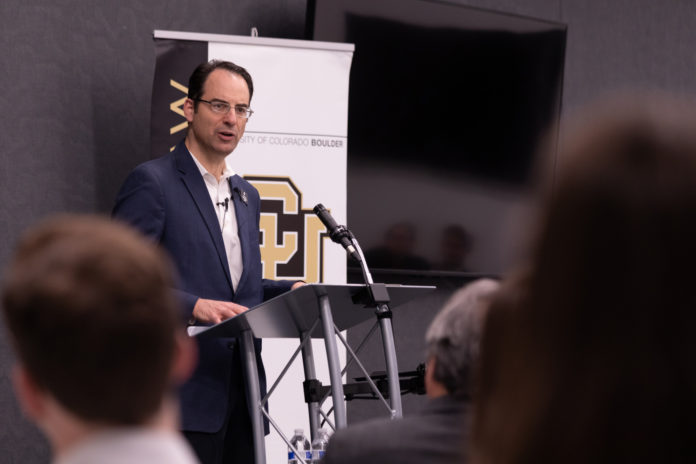
As Colorado attorney general, Phil Weiser said he doesn’t want to hear that the office should keep doing things the way they’ve always been done just because. And he said government innovation is about more than just improving efficiency for its own sake: It can affect the faith people have in their government.
“People are looking at these [legal and governmental] institutions and saying, ‘I don’t believe they’re working for me,’” Weiser said. “Right now we’re in an existential moment to prove that we can make government work.”
He made his remarks for a Colorado Law Talks speech put on by the University of Colorado Law School. The former CU Law dean focused his talk on the implication government innovation has for democracy, how Colorado’s entrepreneurial community positions the state to stay on the forefront and what he hopes to do as attorney general in keeping with his philosophy of innovation in government.
Weiser has already established himself as an advocate of government innovation as founder of the CU’s Silicon Flatirons Center, which holds an annual pitch night for its Government Entrepreneurial Leadership Accelerator. Through the accelerator, teams of law students and government employees come up with programs to improve efficiencies and save money in Colorado’s governments.
Weiser used the development of the Energy Star certification system as an example of a government innovation that responded to consumers’ wants. Created in 1992, it provides information about the energy efficiency of appliances, homes, commercial buildings and industrial plants.
“Consumers wanted energy-efficient appliances, if only they knew which ones met those standards,” he said. “And so the government developed this Energy Star certification program, which has saved consumers at this point probably billions of dollars, and has become an effective way of addressing greenhouse gas emissions.
Colorado as a Pioneer
Developments in three very different areas of law in Colorado stand out to Weiser as examples of how Colorado can be a beacon of government innovation. He first pointed to the obscure area of water law.
Communities in the San Luis Valley have drained their aquifers because of water shortages, and the state engineer directed the valley to come up with innovative strategies to replenish its aquifers in 20 years. Sub-districts were created in the area around the river basin in order to collaborate and come up with ideas for using less water.
“That inspires me about what we need to do in public policy more generally,” Weiser said.
Weiser also spoke about a recently announced agreement for cooperation by the Catholic Church in Colorado in new initiatives to investigate sexual abuse of minors. Former U.S. Attorney Bob Troyer will conduct an independent investigation and write a public report, and the investigation will refer findings of criminal conduct to law enforcement. Colorado’s three dioceses will also fund a program to compensate victims of abuse by clerical members.
Former Attorney General Cynthia Coffman initiated the review process.
“Other state AGs have called up and said, ‘How did you get this done?’” Weiser said. “The answer is, because we have the right people in Colorado working together to develop an effective solution.”
But perhaps the area of greatest challenge, he said, is addressing the scourge of the opioid crisis through approaches such as improving access to treatment, re-evaluating the effectiveness of the “War on Drugs” and destigmatizing substance use. “This is going to call on our collaborative problem-solving talents in a way that will make what we’re doing with water and the Catholic Church look very easy. The damage across our state I can’t overstate.”
Prompted by questions from attendees, Weiser also spoke about innovating in areas such as telehealth and bail reform. A key goal of the Commission on Criminal and Juvenile Justice, he told Law Week, is developing risk assessment tools as an alternative to cash bail. He said he is mindful of reported limitations of risk assessment algorithms, such as the potential for built-in biases based on characteristics like race and class.
“We’ve been using ability to pay as a proxy for, ‘Are you a danger?’” he said. “Which, plainly, it’s not.”
Colorado’s judiciary and legislature have also taken steps to examine pretrial practices in the state with the understanding many people who spend time in jail before they’re convicted of a crime can’t afford cash bail, and it has negative rippling effects such as missing work and being away from family.
He said governments’ aversion to innovation comes from a fear of negative consequences from making mistakes. But the mindset should shift, he said, from a fear of doing things wrong to fear of not doing things right.
“But government doesn’t often [keep track of] when government failed to act and a good thing that could’ve happened didn’t happen. The aversion to risk sets you up to make a lot of Type II errors, because we’re not keeping track of the Type of II errors, and you can’t manage what you can’t measure.”
—Julia Cardi

